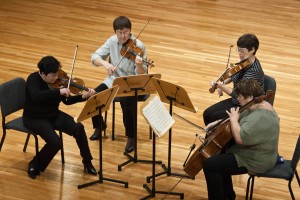By Victoria Branca
Correspondent
This Thursday’s Brown Bag Series was quite literally music to one’s ears thanks to a visit from the Moscow String Quartet. The foursome gave a sneak preview of their upcoming Saturday, Oct. 1 performance and spoke to audience members about the history of the group and life under Soviet rule.
The Moscow String Quartet is comprised of Eugenia Alikhanova on violin I, Galina Kokhanovskaia on violin II, Tatiana Kokhanovskaia on viola, and Olga Ogranovitch on the cello. Interestingly, the women all perform on instruments dating from the 1700s, except violinist Kokhanovskaia, who performs on a 1698 Stradivarius violin.
When asked about how long they have been playing together, Kokhanovskaia laughed teasingly, saying, “Don’t tell them how long.”

Alikhanova, the group’s founding member, has been playing with Kokhanovskaia since 1975 when the two met as students attending the Moscow Conservatory and the Moscow Gnessin Musical Institute. They attribute their coming together to their professors. In 1981, Ogranovitch joined the group, followed by the other Kokhanovskaia in 1997.
The two pieces performed were Mozart’s String Quartet K.575, a piece dedicated to the King of Prussia, and Shostakovich’s String Quartet No. 2 in A major Op. 68 from 1944.
Referring specifically to the Shostakovich composition, one student asked how these women put themselves in the mindset to play such a dark piece.
Alikhanova answered: “We lived this … It is very close to us.”
She spoke briefly about her family and her coming from a musical background. Her mother was a well-known violinist in Russia but never played abroad. Her brother was also a pianist and professor at the Moscow Conservatory.
Alikhanova’s father was the physicist Abram Alikhanov, who founded the USSR’s first nuclear reactor in addition to founding the Institute for Theoretical and Experimental Physics in 1945. She also spoke about growing up in Soviet-Era Russia and about how her father’s work affected both himself and his family.
One memory Alikhanova recalled was of having microphones planted in her family’s home by the government. She recounted how they were present even in the children’s rooms, but everyone in the family knew that they were there.
Ogranovitch recalled a previous time when members of the group met with the College’s own John Laughton, dean of the School of the Arts and Communication, in Moscow. She laughed when recounting their meeting many years ago, saying that at the time, he was “like a person from a different planet.”
The group also answered questions from audience members regarding their opinions about today’s young musicians. When asked about the biggest difference between students of their time and students of today, they agreed that there is much more freedom to go abroad for today’s students. In their time, the only way to go out of the country was to win competitions, but today’s students have many more opportunities available to them, they said.
Today, the quartet is based in Denver, Colorado, where they freelance, teach music and tour all over the world.






